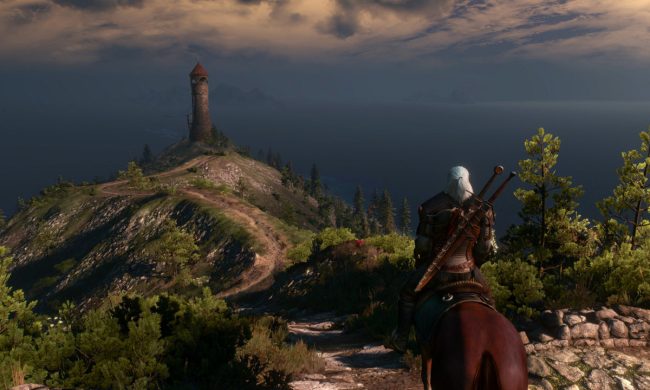Silver swords and gold coins are a Witcher’s best friends. The Witcher: Monster Slayer is an augmented reality mobile game where players venture out into the real world, slaying monsters and completing quests. As players are exploring, they’ll buy new swords, armor, and items to aid them on their journey. However, these items all cost gold — and a lot of it. So how do players earn more gold in The Witcher: Monster Slayer?
- The Witcher season 2: Everything we know about the Netflix series’ next adventure
- The best iPhone games currently available (August 2021)
- The best single-player games
Completing quests

The Witcher: Monster Slayer is about much more than traveling around and aimlessly killing monsters. Quests will have you circling all over your neighborhood and surrounding area in true video game fashion. Quest givers are marked with yellow exclamation marks, and each stage of the active quest is marked by a yellow question mark. Thankfully, quest steps will keep you within a 1,000-meter radius of the quest giver, often doubling back on themselves and ending somewhere close to where they started.
Witchers are rewarded with experience points and a pouch of gold ranging from 50-100 pieces upon completion. While you can quickly exhaust the quests currently available, the XP gained is a roundabout way to earn more gold through leveling up, allocating skills, and exploring.
Daily challenges
You can find your daily challenges right above the shop icon after loading up The Witcher: Monster Slayer. These challenges are combat-based tasks that will reward you with a golden prize upon completion. Tasks include “Kill five monsters vulnerable to Strong Attacks” or “Throw three bombs.” Some are easier than others. Thankfully, you can re-roll your daily challenge once to get a new one immediately. However, you’re stuck with that new challenge until you complete it, or you trash it. Once completed or trashed, it’ll take several hours before a new challenge opens up.
Complete seven daily tasks to unlock a special reward; however, you can only earn one stamp per day. You can see how many stamps you have by looking above the daily challenge list. The reward for these challenges varies. Normally, it’s 50 gold; however, we’ve seen it go as high as 80 for more difficult tasks.
Nemetons

At level 10, you’ll unlock the ability to interact with Nemetons in The Witcher: Monster Slayer. These are the leafless trees you’ve seen while out on your Witching adventure. Tap on the Nemeton to see what sort of monsters are lurking inside. You’ll have to fight two easy monsters and one medium monster to clear the Nemeton and earn the reward. Access to Nemetons is why early-game quests are so important. So grind those first few quests and fight every easy monster you come across to reach level 10.
Nemetons offer huge rewards by way of XP, gold, and materials. Always make sure you’ve got room in your inventory to collect all the treasures inside. Each cleared Nemeton will earn you 50 gold coins and between 500 and 700+ XP. The wide range of XP earned depends on how well you perform, weapon buffs, and other bonuses like “+100XP for a first-time kill.”
You can only collect 50 gold from Nemetons three times per day and must wait three real-time hours between each clear. However, you can use Monster Bait to lure more monsters to the Nemeton and go right back in.
Don’t waste Nemeton opportunities, especially when grinding for a new silver sword or better armor. Make sure to have the appropriate oils, bombs, and potions on hand for whatever monsters are lurking inside. It’s also important to note that you’ll only see what the most powerful monster — the “boss,” if you will — is weak to at the prepare screen.
For example, an Insectoid Nemeton might feature two Endrega Workers (easy) and an Endrega Drone (medium). While all three monsters are weak to fire and steel, the workers are weak to fast attacks, while the drone is weak to strong. It’s safe to assume the bigger monsters are weak to strong attacks, but if you’re not sure, you can pay attention to your critical hit meter. If it’s filling up, you’re making the right attack.
Spending real money

Of course, like any other game, players have the option to spend real money on in-game items. When it comes to The Witcher: Monster Slayer, the only thing that’s “helpful” to buy (without being pay-to-win/play) is the Witcher Starting Pack. The Starter Pack grants you a silver sword, several alchemy stations, a bundle of ingredients, and items.
When it comes to buying weapons, armor, and pouch upgrades, you’ll be spending anywhere from 1,600 gold for the cheapest steel sword to 12,000 for the most expensive silver sword. Armor sets get just as expensive, the cheapest one costing 3,400.
To buy gold in The Witcher: Monster Slayer, head to the shop and scroll down to the bottom of the Main tab. You can spend:
- $0.99 for 200 gold
- $4.99 for 1,300 gold
- $9.99 for 3,500 gold
- $19.99 for 8,500 gold
- $49.99 for 26,000 gold
- $99.99 for 70,000 gold
What should you spend gold on in The Witcher: Monster Slayer

So you’ve amassed a heavy bag of gold. What should you spend it on? You might want to get yourself a shiny new sword or a nice set of armor, for starters. Let’s look into the different options and decide which are best.
Best swords to buy
There six steel swords and seven silver swords in The Witcher: Monster Slayer. Between silver and steel, most of these weapons offer the same buffs with the exception of the most expensive ones and Melltith, a silver sword with a 15% chance to inflict fire damage.
For starters, there’s no point in buying the most expensive silver sword, A’Baeth, for 12,000. This sword will increase XP gained from killing monsters by 25%. That being said, by the time you’ve amassed 12,000 (unless you spent real money for it), leveling up is no longer a major concern. You’ve probably already unlocked Nemetons between the sheer number of challenges and quests you’d have to complete to earn that much gold.
Instead, opt for the most expensive steel sword, Caerme, for 6,400. Caerme increases your critical hit damage by 50%. Paired with the right oils and potions, Caerme can deal massive amounts of damage to harder enemies. Of course, that hangs on you being good at landing perfect critical hits.
Alternatively, you may opt for the Ursine Steel (1,600) or the Ursine Silver (1,800) for 15% bonus damage from strong attacks. Why? Because most of the harder enemies in The Witcher: Monster Slayer are weak to strong attacks. Save up some more gold and come back for the fast attack counterparts.
Best armor to buy
As for armor, again, there’s no need to buy the most expensive armor set (unless you spent real money). The Kaer Morhen Armor also provides a 25% XP boost, just like the sword. Those starting from level 1 who dropped $50 on the game will benefit from buying the most expensive items for a combined 50% XP boost. Everyone else should stay away.
On the inexpensive side (3400), the Ursine Armor is the best. Upon taking damage, you’ll only lose 20% of your critical hit meter. Usually, it resets to zero, so keeping most of your progress is huge in close fights.
For 6,400 gold, you can choose between the Griffin Armor or the Manticore Armor. The Griffin will reflect 10% of damage back at an enemy after each parry (not just perfect parry). The Manticore automatically applies the White Gull potion before every fight, which increases the effectiveness of your other potions by 100%. For example, if you drank a Swift potion for 50% bonus HP, you’d effectively double your HP with the Manticore Armor.
Other than weapons and armor, you can also spend gold on items, scrolls, crafting stations, and pouches. Don’t waste gold on anything you can make yourself or receive in a pack. Instead, save up to buy extra crafting stations and pouches to increase your inventory. Furthermore, don’t waste money on Monster Bait. Here’s why.
Monster Bait costs 200 gold. You only make 50 gold every time you clear a Nemeton. Therefore, you’d have to clear four Nemetons to make your money back. Is it worth the XP and items? No, we don’t think so.



